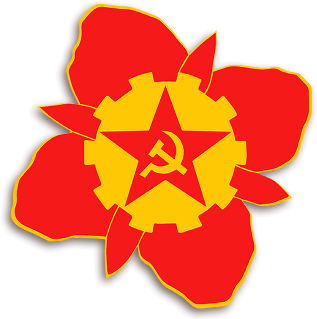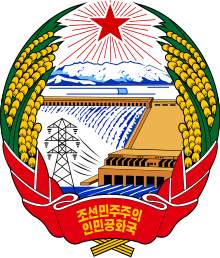
The Chinese Communist Party (CCP), officially the Communist Party of China (CPC), is the founding and sole ruling party of the People's Republic of China (PRC). Under the leadership of Mao Zedong, the CCP emerged victorious in the Chinese Civil War against the Kuomintang, and, in 1949, Mao proclaimed the establishment of the People's Republic of China. Since then, the CCP has governed China and has sole control over the People's Liberation Army (PLA). Each successive leader of the CCP has added their own theories to the party's constitution, which outlines the ideological beliefs of the party, collectively referred to as socialism with Chinese characteristics. As of 2022, the CCP has more than 96 million members, making it the second largest political party by party membership in the world after India's Bharatiya Janata Party. The Chinese public generally refers to the CCP as simply "the Party".

The Korean People's Army is the military force of North Korea and the armed wing of the Workers' Party of Korea (WPK). Under the Songun policy, it is the central institution of North Korean society. Currently, WPK General Secretary Kim Jong Un serves as Supreme Commander and the chairman of the WPK Central Military Commission. The KPA consists of five branches: the Ground Force, the Naval Force, the Air and Anti-Air Force, the Strategic Rocket Forces, and the Special Operation Force.
Andrew Nicholas Oliver and Philip Edward Oliver, together known as the Oliver Twins, are British twin brothers and video game designers.

Liu Bocheng was a Chinese military commander and Marshal of the People's Liberation Army.

The National Congress of the Chinese Communist Party is a party congress that is held every five years. The National Congress is theoretically the highest body within the Chinese Communist Party (CCP). Since 1987 the National Congress has been held in the months of October or November. The venue for the event, beginning in 1956, is the Great Hall of the People in Beijing. The Congress is the public venue for top-level leadership changes in the CCP and the formal event for changes to the Party's Constitution. In the past two decades the National Congress of the CCP has been pivotal at least as a symbolic part of leadership changes, and therefore has gained international media attention.

The Communist Party of Canada is a federal political party in Canada, founded in 1921 under conditions of illegality. Although it does not currently have any parliamentary representation, the party's candidates have previously been elected to the House of Commons, the Ontario legislature, the Manitoba legislature, and various municipal governments across the country. The party has also made significant contributions to Canada's trade union, labour, and peace movements.

Miguel Figueroa is a Canadian political activist who was the leader of the Communist Party of Canada from 1992 to 2015. He is known for the landmark Figueroa case, which redefined the role of small parties and Canadian Parliamentary democracy, as well as his role re-establishing the Communist Party of Canada in the post-Soviet era.

Han Xianchu was a general of the Chinese Communist Party. Han participated in many military campaigns and battles such as Battle of Pingxingguan, Liaoshen Campaign, Pingjin Campaign, Hainan Campaign, and the Korean War. In 1955 he was among the first group of military leaders to be awarded the Shang Jiang rank.

The 17th Central Committee of the Chinese Communist Party was elected by the 17th Congress on 21 October 2007, and sat until the 18th National Congress in 2012. The 17th CC is composed of full members and alternate members. It was followed by the 18th Central Committee of the Chinese Communist Party. A member has voting rights, while an alternate does not. If a full member is removed from the CC the vacancy is then filled by an alternate member at the next committee plenum — the alternate member who received the most confirmation votes in favour is highest on the order of precedence. To be elected to the Central Committee, a candidate must be a party member for at least five years.

Zhang Wannian was a general of the People's Liberation Army (PLA) of the People's Republic of China.

The Cabinet of Democratic People's Republic of Korea or North Korea (Naegak) is, according to the Constitution of North Korea, the administrative and executive body and a general state-management organ in the Government of North Korea. The Cabinet's principal newspaper is Minju Choson.

The 18th Central Committee of the Chinese Communist Party was elected by the 18th National Congress on 15 November 2012, and sat in plenary sessions until the communing of the 19th National Congress in 2017. It was formally proceeded by the 17th Central Committee.

The Communist Party of Canada (Marxist–Leninist) is a Canadian federal political party founded by Hardial Bains in 1970. The CPC(M-L) has been registered with Elections Canada as the Marxist–Leninist Party of Canada (MLPC) since 1974 as the party is prohibited from using the Communist Party name in Canadian elections to avoid confusion among voters. The party developed separately and independently from the Communist Party of Canada (CPC), originating among students and intellectuals in Canada during the 1960s. After a period of alignment with Maoism and China, the CPC(M-L) pursued a Hoxhaist, pro-Albanian line until the early 1990s. At present, the party directs most of its public support to Cuba and North Korea.

Ismail Amat was a Chinese politician of Uyghur ethnicity who served as Chairman (Governor) of Xinjiang Uyghur Autonomous Region, State Councillor, Vice-Chairman of the National People's Congress and Vice-Chairman of the Chinese People's Political Consultative Conference (CPPCC).
Zhang Xuezhong is a Chinese politician and a deputy to the National People's Congress. He has held important party positions in the provinces including the vice-governor of Gansu and the Party Committee Secretary of Sichuan Province. He has also held the post of the Minister of Human Resources and Social Security in the central government. Zhang is considered an ally of the former General Secretary of the Chinese Communist Party (CCP) Hu Jintao.

The 19th Central Committee of the Chinese Communist Party was elected by the 19th National Congress in 2017, and sat until the next National Congress was convened in 2022. It formally succeeded the 18th Central Committee of the Chinese Communist Party and preceded the 20th Central Committee of the Chinese Communist Party.

The 5th Central People's Committee (CPC) of North Korea was elected by the 1st Session of the 5th Supreme People's Assembly on 28 December 1972. It was replaced on 17 December 1977 by the 6th CPC.

The 6th Central People's Committee (CPC) of North Korea was elected by the 1st Session of the 6th Supreme People's Assembly on 17 December 1977. It was replaced on 5 April 1982 by the 7th CPC.

The 7th Central People's Committee (CPC) of North Korea was elected by the 1st Session of the 7th Supreme People's Assembly on 5 April 1982. It was replaced on 30 December 1986 by the 8th CPC.

The 8th Central People's Committee (CPC) of North Korea was elected by the 1st Session of the 8th Supreme People's Assembly on 30 December 1986. It was replaced on 26 May 1990 by the 9th CPC.












